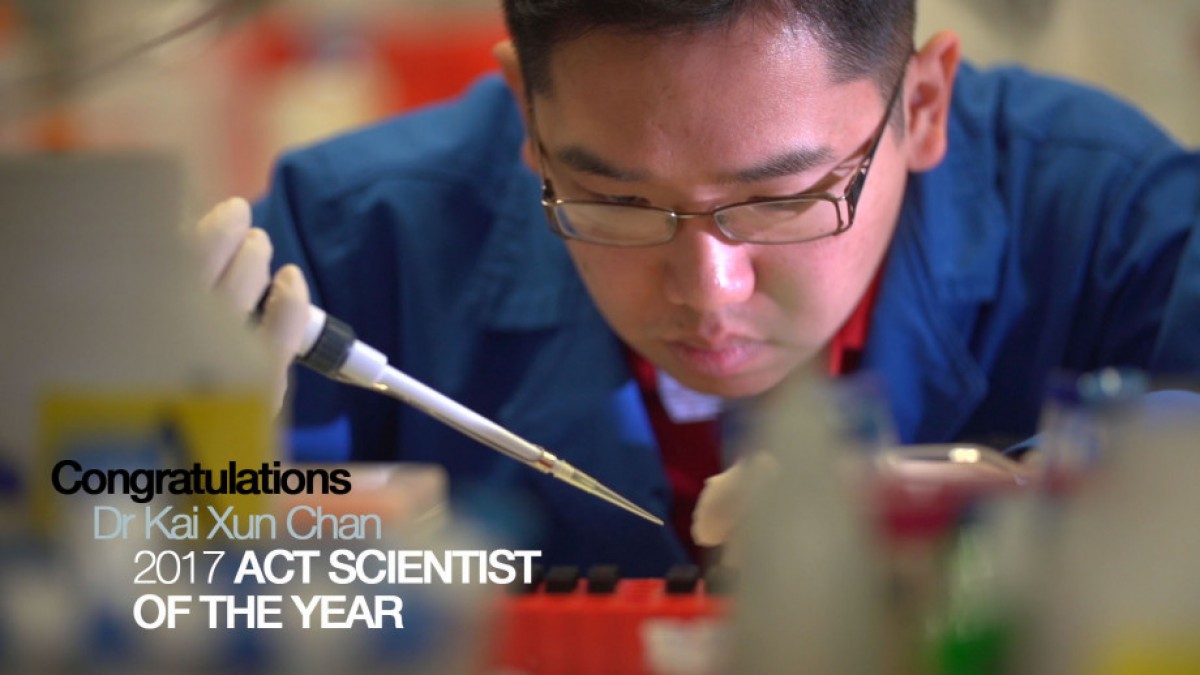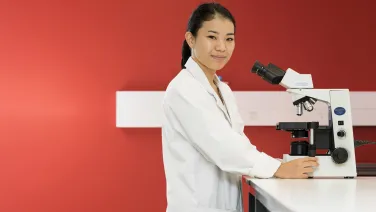Meet the ACT Young Scientist of the Year
Meet Dr Kai Chan, the 2017 ACT Young Scientist of the Year. Dr Chan is a plant biologist who came to ANU as an undergraduate student in 2007 and has gone on to complete his Bachelor of Biotechnology (First Class Honours and university medal in Biology), as well as his PhD in Plant Sciences.
Dr Chan, what do you do at ANU?
The broad aim of what I'm trying to achieve is find ways to make our crops more drought resistant in the future. Now to get to this final aim, what I'm doing right now is trying to understand how exactly plants sense drought stress. How do plants know when there's a lack of water, how do plants know when the sunlight is too intense for them, and how plants then use those factors to guide their immediate responses to that situation. More broadly, how does that lead to medium and long term responses that ultimately affects how the plants grow and how much seed they set and then how much yield they can produce. All of that combined, hopefully, is then translatable to crop species in the long term.
My key finding in the past two years was to identify a particular sensor protein residing in plant cells. And the role of this sensor protein is telling the plant leaves when drought stress hits. So it's able to tell when water is becoming scarce, and when the sunlight is too strong, thereby controlling a molecular process in the plant leaves that results in the pores on the leaves closing. Closing these pores is important during drought stress periods. Having now mapped this pathway, we can now start looking at how we want to manipulate these findings.
What is your favourite spot on campus?
One of my favourite places would be University Avenue and the surrounding areas on a Sunday.
Why is that?
Just the peace and quiet that you get. I think the ANU campus is the most stunning when you've got the peace and quiet surrounding the campus and you've got the resident wildlife coming out so the ducks, rabbits and, towards dusk, the possums coming out. It's just a very serene and tranquil picture. As an academic whose life is often pretty busy and pretty rushed, being able to experience that moment of calm just gives your brain a very different space to think in. You can often get inspiration from moments like that.
If you had to find your way out of an escape room, who would you want to help you and why?
My wife - because in many ways she's the perfect balance to me. As a person and as a scientist I'll often come up with the outlandish ideas and she'll be the one who grounds me in reality and says 'this is not achievable but this is, you should pursue this instead'. In an escape room situation where I might think a little bit too much outside the box, she might be the one who tells me literally this is what you should do.
What does it mean to you to be recognised with the 2017 ACT Scientist of the Year award?
I think it's a huge honour for me personally to be recognised in this way. It's very gratifying to know that the work that you're doing is relatable to the public and that the public sees the importance of your work.
I think scientists generally agree that our career is a very challenging one comprised of long working hours, often uncertain employment and funding situations and the pressure to achieve and to discover new things. But we do it because we are passionate about understanding the mysteries of life and we want to do something that helps society. So just having this award broadly speaking is an important step for scientists in the ACT. We are home to so many talented scientists and particularly for young scientists, having this award serves as an inspiration for them. Secondly it tells young scientists that the road to the top in your profession isn't really one long climb but there are achievable steps where you can pause and take stock of your achievements. So I think this is a really good platform for us to say 'now I want to go on and achieve bigger things in the future'.
Your research has also involved the support of others - is there anyone you'd like to acknowledge, who has helped get you to where you are today?
I'd really like to acknowledge the contributions of various people through my research. There are many, but undoubtedly the foremost would be my mentors Professor Barry Pogson (here at ANU) and Dr Gonzalo Estavillo (at CSIRO). They've both helped train me up from an aspiring undergraduate who didn't have a clue what to do in the lab to now a promising early career scientist.
In terms of the funding, I think it's really important to acknowledge the Australian Research Council Centre of Excellence in Plant Energy Biology. The Centre has been funded continuously since 2006, coinciding with research that started by looking at how plants sense their environment. It has helped me get access to cutting edge instruments but also the continued support has meant we can retain talented people in science much longer. This has allowed the centre to become home to some of the world's best scientists who collectively have supported me to achieve greater things than I would have on my own.
Read more about Dr Chan receiving the 2017 ACT Scientist of the Year here.


